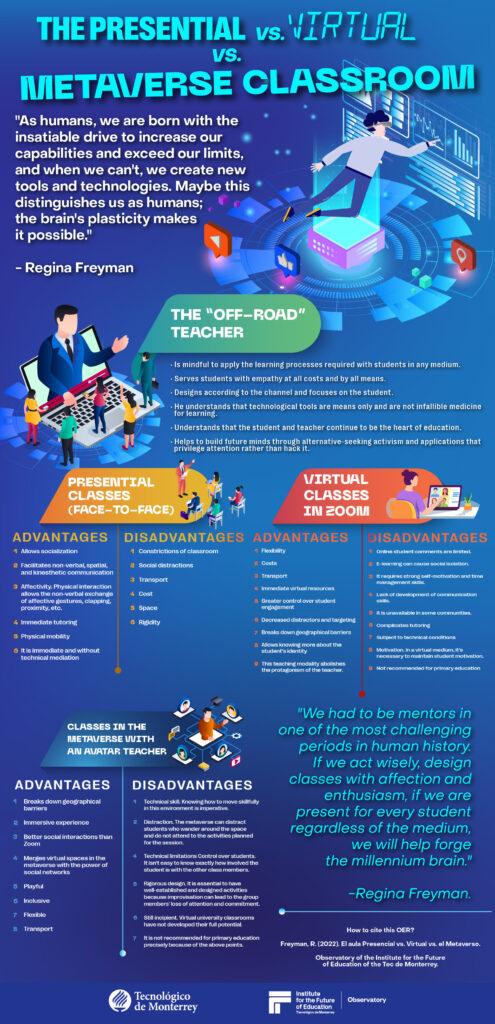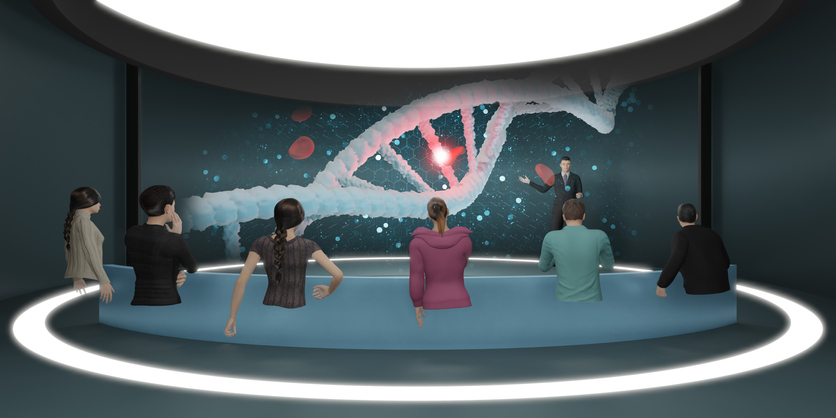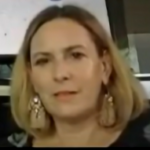I have been fortunate to be a teacher at different educational levels, from preschool to higher education, and for teacher training. Advising and exchanging knowledge became my passion. Today’s teachers have learned psychology to understand students, didactics to facilitate knowledge, neuroscience to understand the brain, game theories, and narrative to attract and seduce human curiosity. Also, we have set out from our confined spaces, museums, and virtual environments, looking for the most appropriate architecture and dynamics to promote understanding. With humility and pride, I confess that I am sure that the teacher of the XXI century is, and will be, a symbol of empathy, an insurmountable tutor, and a guide who, without any superiority, lights the exciting path of learning.
Below, I share an infographic that compares three teaching formats: face-to-face, virtual, and in the metaverse. I invite you to analyze it and share it with your colleagues. I would also like your opinions and what you would add to the infographic in the comments section of this article. What would you change? What has been your teaching experience in these three teaching modalities?

Reflections
- Learning should be active, not passive, in any medium or field.
- Design is the soul of the educational process. Instruction facilitates precise communication among the actors and the persistent cognitive transition to acquire knowledge.
- An activity, dynamic, or classroom application should engage, not distract.
- We must encourage social interaction because it is our way of learning. As mimetic beings, we transfer “memes,” units of cultural information, from mind to mind through the “viral” processes of copying behaviors.
- Learning should be playful, interactive, active, engaged, meaningful, iterative, and joyful; that is, what we call “playful learning with a well-articulated learning objective.”
- A teacher with too many students cannot be relevant in any medium.
- Consider the six “C” s presented by Golinkoff and Hirsh-Pasek in their book Becoming Brilliant.[1]”:
1. Collaboration.
2. Communication (speaking, writing, reading, and listening).
3. Content: traditional content + “learn to learn” skills.
4. Critical thinking.
5. Creative innovation: synthesis of content and critical thinking.
6. Confidence.
- Learning about the concepts of “the discontinuous and the illusion of infinity [2]” is essential to understand the new generations. As the writer Alessandro Baricco tells us in his book “The Game,” the new generations’ world perception is affected by the idea of the discontinuous, that is, looking at reality as disjointed events and their person as an individual, forgetting the importance of the collective. Their reality is a flow devoid of social rituals governed by the virtual world and not tied to schedules or geographies. Similarly, platforms and search engines make us feel that infinity is just a click away: Spotify provides all the music; Google, all the knowledge; Facebook, as many friends as possible; Tinder, a catalog of unrestricted love, and so on.
- Education concerns us all. We are common organisms that are more than the sum of the parts. The knowledge society is not individual-based; it relies on the community of interaction, which guarantees the survival of our species with knowledge, affections, and talents.[3]
I invite you to improve education together by sharing your teaching experience through an Edu bits article in the Observatory of the Institute for the Future of Education at Tec de Monterrey. Do not forget to leave your comments in the section below in this article.
[1] Golinkoff, R., Hirsh-Pasek, K. (2016). Becoming Brilliant: What Science Tells Us About Raising Successful Children. American Psychological Association (APA) 1st edition (May 15, 2016).
[2] Baricco, A. (2019). The Game. Buenos Aires: Anagrama.
[3] Verónica Boix Mansilla (Harvard academician who coined the concept of “global competition” in 2011).
About the Author
Regina Freyman (regina.freyman@tec.mx) is a professor at Tecnológico de Monterrey (Tec). She studied letters at UNAM and specialized in short stories at IBERO but is happy working for more than 12 years for TEC. She likes well-spoken words and well-told stories.
References
Baricco, A. (2019) The Game. Anagrama.
Wolf, M. (2019) Reader Come Home. Harper Paperbacks.
Demeneix, B. (2014) Losing our Minds How Environmental Pollution Impairs Human Intelligence and Mental Health Barbara Demeneix. Oxford Series in Behavioral Neuroendocrinology: https://www.researchgate.net/publication/264905260_Losing_our_Minds_How_Environmental_Pollution_Impairs_Human_Intelligence_and_Mental_Health_Barbara_Demeneix_From_the_Oxford_Series_in_Behavioral_Neuroendocrinology
Edition by Rubí Román (rubi.roman@tec.mx) – Edu bits and Webinars Editor – “Learning that inspires” – Observatory of the Institute for the Future of Education of Tec de Monterrey.
Translation by Daniel Wetta.
This article from Observatory of the Institute for the Future of Education may be shared under the terms of the license CC BY-NC-SA 4.0 
)
)


)